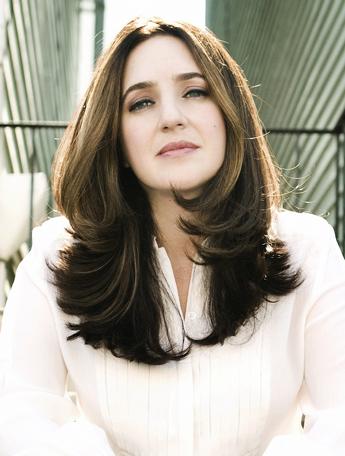After Visiting D.C. Schools, Dinnerstein at the Kennedy Center Feb. 9
By • April 11, 2014 0 1275

The pianist Simone Dinnerstein, the late-blooming star of the classical musical world, is—to put it in Willie Nelson’s terms—”on the road again,” and she’s not traveling light.
It’s not that Willie Nelson has anything to do with the occasion, but you wouldn’t now be surprised to find out that he did.
In 2007, Dinnerstein soared into the musical stratosphere with her recording of Johann Sebastian Bach’s “The Goldberg Variations,” a kind of daunting test that pianists worth their salt or fingers seem compelled to play or record, and not just because it’s an intrinsically difficult piece, but because others have climbed that particular mountain, most notably Glenn Gould.
Dinnerstein soared with the “ Variations” and her self-financed recording on Telarc Records in 2007, scoring the number one classical recording that year, and tackling the challenge at a time when she was pregnant. Last year, she went on tour with a program of “The Goldberg Variations,” stopping at the Music Center at Strathmore. Not only that, but she came out with the album “Night,” collaborating with singer-songwriter Tift Merritt, an eclectic program of new works and classical music.
Now, she’s coming back, this time on Sunday, Feb. 9, in a 3 p.m. recital at the Kennedy Center’s Concert Hall, presented by the Washington Performing Arts Society. She’s once again with her old boon companion and lifetime passion, Johann Sebastian Bach, performing his 15 two-part Inventions, which headlines an eclectic program that includes Beethoven’s Sonata No. 32 in C minor, Op 111 and two very different contemporary composers, Nico Muhly and George Crumb.
In addition, her most recent recording on Sony, “J.S. Bach: Inventions and Sinfonias,” debuted in the top spot on the Billboard Classical Chart in its first week of sales.
“The first time I ever encountered the ‘Inventions,’ I was nine years old,” she said. “I thought then I could never play them, that they were wholly beyond my abilities. Bach meant the ‘Inventions’ to be educational tools for musicians, a guide for teachers and musicians. But they are much more than that, they taught me about duality, about two voices. I’d always thought until then that music was melody and accompaniment. When you listen—and musical training is as much about listening as it is about playing—you hear two continuous and independent voices.”
“I like the presence of the works by Crumb and Muhly. Crumb is fearless with his compositons, in terms of what he tackles. Muhly is still young—he’s in his thirties, he’s written the opera, “Two Boys,” and he’s working with old, traditional English Virginal music while at the same time being something of a minimalist.” The connection to Bach’s two voices becomes obvious when you listen to her talk about the music.
She will be playing Crumb’s “Eine Kleine Mitternacht Musik,” which is a nine-movement suite for amplified piano, based on Theolonius Monk’s 1940’s jazz standard “Around Midnight.” On its face, it seems like an illustration of resonant point counterpoint.
Muhly has composed works for ensembles, soloists and organizations, he did the score for the film, “The Reader,” for which Kate Winslet won an Oscar. Muhly’s work, he has said, was designed “to be navigation challenge for Simone Dinnerstein, who, aside from her technical prowess, has an emotional and interpretive virtuosity I was very interested in exploring.”
She will be playing Muhly’s “You Can’t Get There From Here,” commissioned by the Terez Music Foundation, which was named after a World War II concentration camp.
“I love this program,” WPAs President Jenny Bilfield said. “And I love that this program focuses the lens on the tandem of talents of composer-pianists spanning several centuries.”
Dinnerstein has brought something else with her: her cherished “Bachpack” initiative, complete with a digital piano by Yamaha, bringing the piano, and herself and her unique gifts and some of Bach’s Inventions to District schools over a period three days, working with children and using the Yamaha Remote Lesson technology found in the Disklavier reproducing piano. Dinnerstein began the Bach packing initiative, in 10 New York-area schools in January. She has also founded Neighborhood Classics, which was launched at P.S. 311, where her son attends school and her husband teaches.
This week, she brought the program to Lafayette Elementary School, Watkins Elementary School, Savoy and Patterson elementary schools, the Washington Latin Public Charter School and Ballou High School as well as Duke Ellington High School for the Arts in Georgetown, participating with Ballou through the Disklavier piano technology this Friday.
She’s also hosted a master class with adult amateur pianists at the Washington Conservatory of Music in Bethesda.

